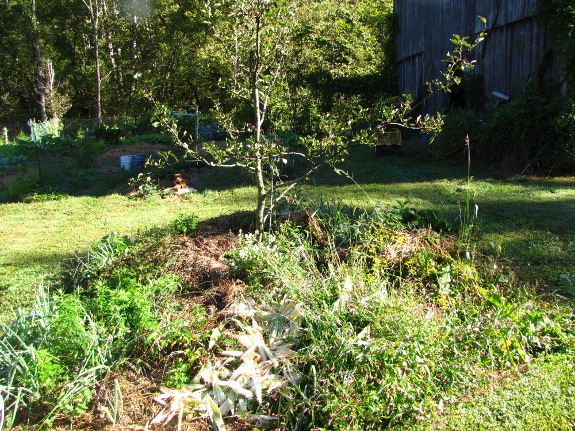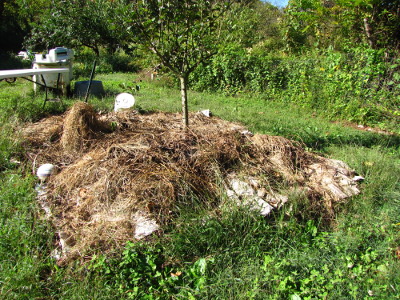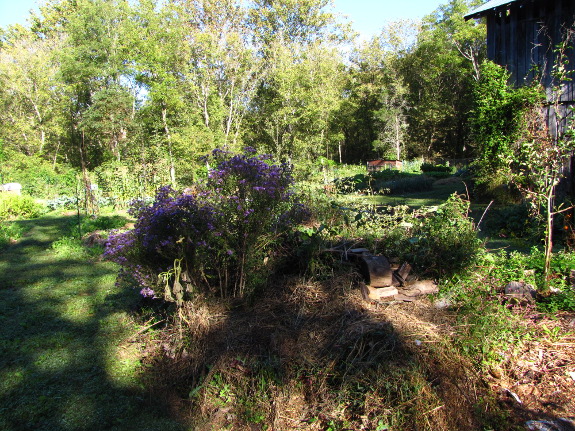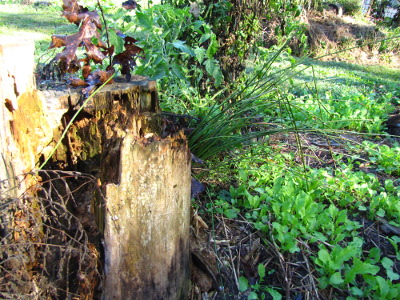
Haphazard mulching of fruit trees

What's the best way to
manage the ground beneath your fruit trees? If you ask ten
people, you may get ten different answers, but the most widespread
choice (at least in the backyard, if you can find enough mulch) is to
smother out weeds using a well-rotted wood chip mulch so the tree roots
don't have to compete with anyone else. The forest gardening
alternative is to use dynamic accumulators that bring up micronutrients
from deep in the  soil and make the minerals
accessible to your trees (although this
option can be problematic if your soil is less than stellar). Over the last few
years, I've stumbled across a third option that might work even better
--- haphazard mulching.
soil and make the minerals
accessible to your trees (although this
option can be problematic if your soil is less than stellar). Over the last few
years, I've stumbled across a third option that might work even better
--- haphazard mulching.
A few years ago, I
started dumping wheelbarrows full of garden weeds around a certain
apple tree throughout the summer. The reason behind my actions
was pure laziness, but at least it killed three birds with one
stone. I'd accidentally let some perennial weeds pop up around
the tree's roots, and the summer was too busy to take the time to root
them out and mulch the tree properly, so I figured dropping some
biomass on top would at least slow the competitors down (which it
did). Meanwhile, I was thinking ahead to the winter when I'd need
to expand
the tree's raised bed
(an effort to keep the roots above high groundwater), and I figured
garden weeds deposited around the edges of the tree's bed would slowly
rot down and expand the planting mound. My final reason was even
simpler --- the tree was at the junction of two vegetable gardens, so
this was an easy spot to drop off weeds rather than running them all
the way to various compost piles.

To my surprise, this
apple tree took off and grew faster than any of my other apples.
Now, you have to take this data point with a grain of salt because no
two apples in my garden are quite alike. They're all different
varieties, and each one is in a different microhabitat. It's just
as possible that this apple did well because it was located where the
groundwater drains into the gully, so it was subirrigated during summer
droughts. But no matter why the apple was doing well, the
haphazard mulching didn't seem to hurt.
 So this year I tried the
method around several more fruit trees. I also used haphazard
mulching to drown out weeds coming up through the brush
pile (my equally lazy approach to hugelkultur around another apple
tree), and around the stump that is adjacent to a third apple.
So this year I tried the
method around several more fruit trees. I also used haphazard
mulching to drown out weeds coming up through the brush
pile (my equally lazy approach to hugelkultur around another apple
tree), and around the stump that is adjacent to a third apple.
The haphazard mulch
allows some weeds to keep growing, but slows them down so they don't
seem to be competing with my trees. It doesn't look as manicured
as a well-managed wood chip mulch, but I'm more interested in results
than in beauty.
At the moment, I
consider haphazard mulching more of a hypothesis than a proven
technique, but I'd be very curious to hear from anyone else who's given
it a try. And from others who've come up with equally easy
solutions to managing the ground under their fruit trees. What do
you do?
| This post is part of our 2012 Forest Garden lunchtime series.
Read all of the entries: |
Want more in-depth information? Browse through our books.
Or explore more posts by date or by subject.
About us: Anna Hess and Mark Hamilton spent over a decade living self-sufficiently in the mountains of Virginia before moving north to start over from scratch in the foothills of Ohio. They've experimented with permaculture, no-till gardening, trailersteading, home-based microbusinesses and much more, writing about their adventures in both blogs and books.
Want to be notified when new comments are posted on this page? Click on the RSS button after you add a comment to subscribe to the comment feed, or simply check the box beside "email replies to me" while writing your comment.

I have woodchips. But I'm in an area where the tree trimmers have to pay to dump their loads so them dropping it at my place is a "freebie" for me. Saves them money too. I just have to haul/spread it.
My problem, and I would love if you'd cover it, is when/how best to remove suckers. I have one plum tree and I have to look up the root stock it's on but this particular root stock suckers like nobody's business. Also, if it's is that bad does anyone think it's worth replacing the tree? It's 5 years old and just now fruiting. My others have done much better. Thoughts?
C, I haven't had a tree that suckers too badly, so hopefully someone else will chime in with their experiences. When I see suckers, I try to pull them off when they're still soft, because that rips a bit into the trunk of the tree and removes the growing tip. Although it seems a bit scary to rip the suckers out, if you instead cut them, the growing tip is left and it tends to sprout back out lots of suckers from that spot. (This is related to the difference between thinning and heading cuts when pruning.)
That said, I often miss suckers until they've hardened up and aren't rippable, and cutting them off doesn't seem to cause too much trouble. It seems like cutting them for a few years makes the rootstock stop sprouting, so it might be worth just waiting a few more years.
doc --- Interesting question. The Holistic Orchard cites one very telling study in which apple tree trunks grew up to 35% more and fruit yields were 15% higher if the trees were mulched vs. unmulched. I'm sure the differences are greater the worse your soil is, but since we're dealing with pretty bad soil where we put our fruit trees, mulch definitely seems worth the effort.
I've also read in another book (can't remember which one at the moment) that mulching keeps the soil warm enough for growth later into the fall, which basically extends the growing season, at least below ground. In addition, woody mulches promote the growth of soil fungi, which team up with plant roots and help them find micronutrients. So, it's possible that competition with weeds for soil nutrients isn't the only reason mulch helps.
I do a similar thing to you, and it works for me. I just pile all my shrub prunings and weeds into one big pile, on the higher side (my block slopes) of my banana tree. Then pour a bucket of diluted urine onto it every day. The nitrogen balances the carbon to help decompostion. As well as irrigating the tree. I also have a large pile (7 cubic yards) of wood chips above my apple and fig trees. I spray water on this every day, as well as dilute urine. Decompostion of woodchip is directly proportional to how moist you keep it, I think. The fig tree roots actually start grow right up through the aged woodchips. I then spread the well aged woodchips down around the trees, and get another free pile of woodchips from the loppers. I agree mulch is absolutely essential on poor soil (like mine). I prefer to have zero root competition for my fruit trees, from any other plants at all.